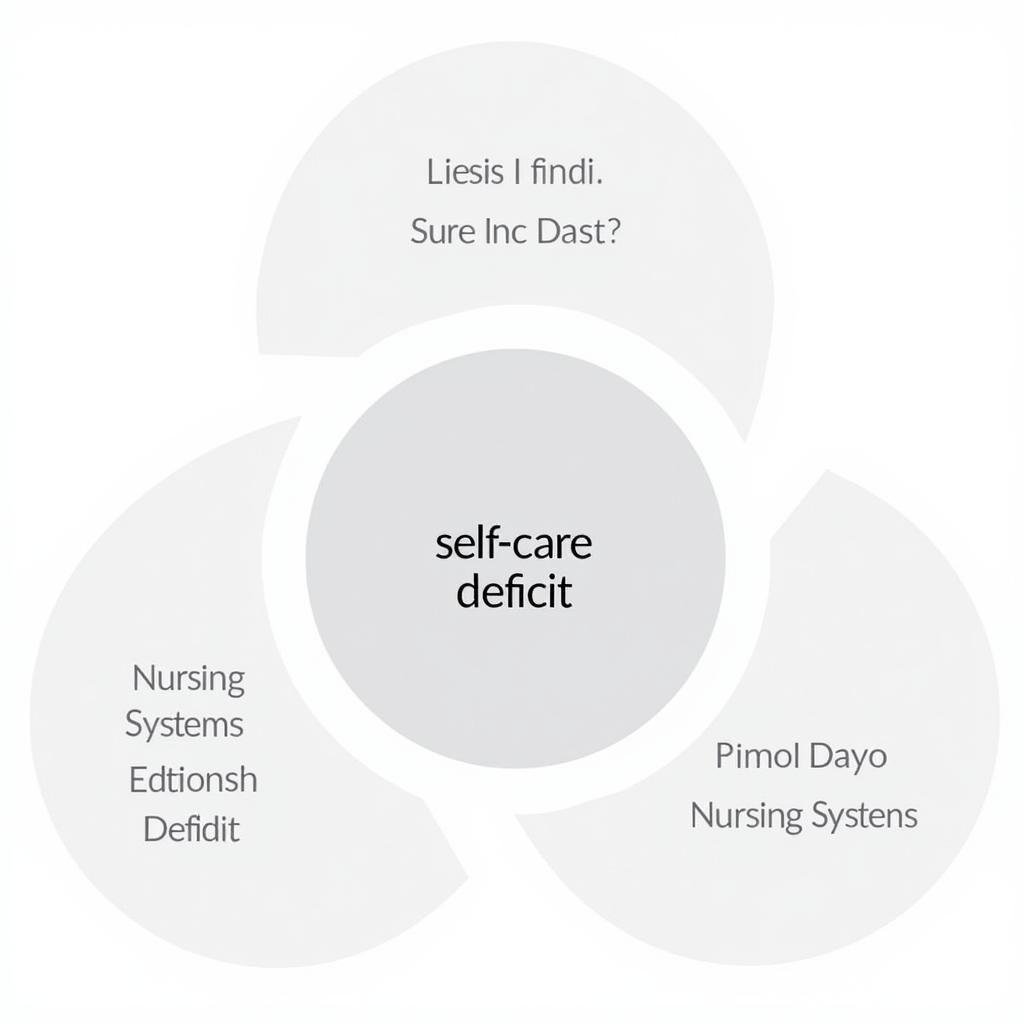Orem’s self-care theory is a grand nursing theory that has significant implications for education and practice. It focuses on the individual’s role in maintaining their own health and well-being. This theory provides a framework for nurses to assess patients’ self-care abilities, identify deficits, and design interventions to support individuals in achieving optimal self-care.
Understanding Orem’s Self-Care Deficit Nursing Theory
Orem’s theory rests on the premise that individuals have an inherent ability and responsibility to care for themselves. This self-care comprises activities individuals initiate and perform on their own behalf to maintain life, health, and well-being. However, when individuals experience limitations in their ability to perform self-care, a self-care deficit arises. This is where nursing intervention becomes necessary.
The Three Interrelated Theories of Orem’s Model
Orem’s Self-Care Deficit Nursing Theory consists of three interconnected theories:
- The Theory of Self-Care: Describes why and how people care for themselves.
- The Theory of Self-Care Deficit: Explains why people can benefit from nursing.
- The Theory of Nursing Systems: Details the relationships between nurses and patients to address self-care deficits.
 Orem’s Self-Care Theory Diagram
Orem’s Self-Care Theory Diagram
Applying Orem’s Theory in Education
Orem’s theory provides a valuable framework for nursing education. It helps students develop a holistic understanding of patient care, emphasizing the importance of individual autonomy and self-management. By learning to assess self-care abilities and deficits, students can design individualized care plans that empower patients to actively participate in their own health.
Developing Critical Thinking Skills with Orem’s Theory
The theory encourages critical thinking by requiring nurses to analyze patient situations, identify self-care demands, and determine appropriate nursing interventions. It fosters a collaborative approach to care, where nurses work with patients to achieve shared goals.
Orem’s Theory in Practice: Empowering Patients
In practice, Orem’s theory guides nurses to develop interventions that address specific self-care deficits. This can range from providing direct care for patients who are completely dependent to educating and supporting patients who can manage most of their care independently.
Examples of Orem’s Theory in Action
- Post-Operative Care: A nurse educates a patient on wound care and pain management techniques, enabling the patient to gradually assume responsibility for these tasks.
- Chronic Disease Management: A nurse works with a diabetic patient to develop a self-care plan that includes medication management, diet, and exercise.
- Rehabilitation: A nurse assists a stroke patient in regaining lost motor skills and encourages self-care activities such as dressing and bathing.
“Orem’s theory is essential for empowering patients,” says Dr. Amelia Hernandez, a registered nurse with over 20 years of experience. “It reminds us that the goal of nursing is not to do everything for the patient, but to equip them with the knowledge and skills they need to care for themselves.”
Orem’s Self-Care Theory: A Foundation for Holistic Nursing
Orem’s self-care theory provides a strong foundation for holistic nursing care. It emphasizes the importance of patient-centered care, collaboration, and empowerment. By focusing on the individual’s ability to manage their own health, Orem’s theory contributes to improved patient outcomes and enhanced quality of life.
Conclusion
Orem’s self-care theory is a powerful tool for both nursing education and practice. By understanding and applying this theory, nurses can empower patients to take an active role in their own health and well-being, leading to improved outcomes and a higher quality of life.
FAQ
- What is the core principle of Orem’s theory? The core principle is that people should be self-reliant and responsible for their own care.
- How does Orem’s theory apply to different patient populations? It can be adapted to various settings and patient populations by focusing on individual needs and abilities.
- What are some examples of self-care deficits? Examples include difficulty with bathing, dressing, medication management, or following a prescribed diet.
- How does Orem’s theory differ from other nursing theories? It uniquely emphasizes the patient’s role in their own care and the nurse’s role as a facilitator.
- How can I learn more about Orem’s theory? Numerous resources, including books and articles, are available for further study.
Need assistance with car diagnostics? Contact us via WhatsApp: +1(641)206-8880, Email: [email protected] or visit us at 910 Cedar Lane, Chicago, IL 60605, USA. Our customer support team is available 24/7.

Leave a Reply